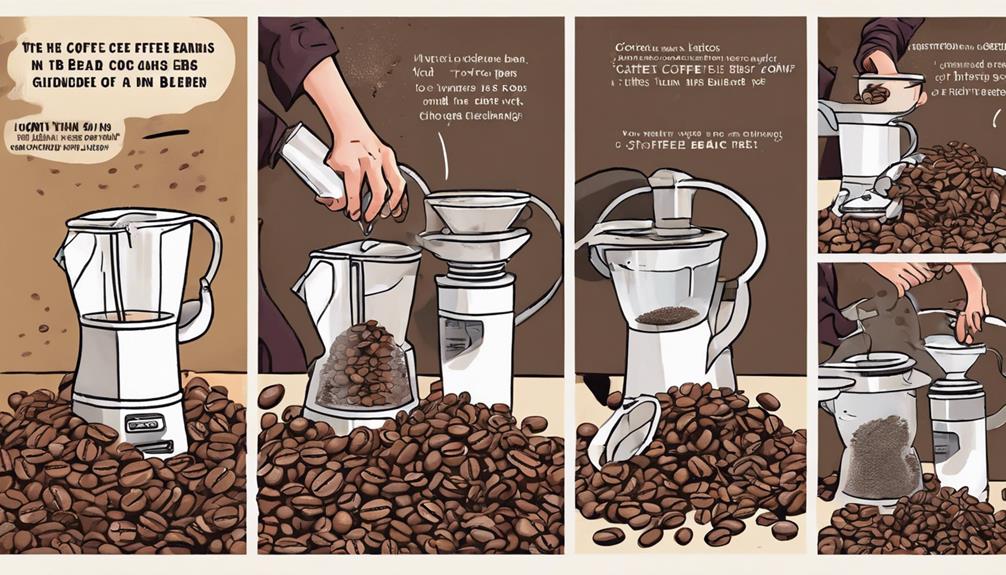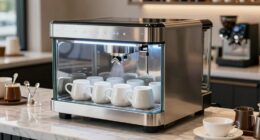When starting a coffee shop, it is best to start small with a kiosk or cart to manage costs effectively. Strategically expand while keeping a close eye on expenses. Provide unique experiences and products to differentiate yourself from competitors. Engage customers through social media and local partnerships. Create a strong business plan with financial forecasts and operational tactics. Make wise hiring decisions and ensure staff are trained in multiple areas to improve productivity. Streamline your supply chain and select suppliers carefully. Choose a location with potential for growth and a competitive edge. In the end, prioritize accurate budgeting and financial planning for a prosperous coffee shop business.
Key Takeaways
- Start small with a coffee kiosk or mobile cart to manage costs.
- Optimize resources gradually to scale up the business effectively.
- Focus on unique product offerings and collaborations with local suppliers.
- Implement cost-effective hiring practices and cross-training for efficiency.
- Forecast expenses, allocate a financial buffer, and utilize budgeting tools.
Small Budget Coffee Shop Planning
When planning a small budget coffee shop, starting small is key to managing costs effectively and gaining valuable experience in the industry. To reduce operational costs and stay within your budget, consider opening a coffee kiosk or mobile cart rather than a full-fledged shop.
A coffee kiosk or cart minimizes real estate expenses and build-out costs, allowing you to focus on serving quality coffee to your customers. By starting with a smaller setup, you can optimize your resources and gradually scale up your small business as you grow and expand.
Starting with a coffee kiosk or mobile cart can cost between $60,000 to $125,000, making it an affordable option for entrepreneurs looking to enter the coffee shop market without breaking the bank. This approach not only helps you save on initial investment but also gives you the flexibility to test different locations and offerings before committing to a larger, more permanent setup.
As you start small and learn the ins and outs of running a coffee business, you'll be better equipped to make informed decisions and set yourself up for long-term success in the industry.
Brand Development Strategies

Define a unique customer experience and product offering that will set your coffee shop apart.
Utilize social media and community engagement to connect with customers on a deeper level.
Build emotional connections to foster loyalty and differentiate your brand in a competitive market.
Unique Product Offering
To establish a strong brand identity for your coffee shop, focus on developing unique product offerings that set you apart from competitors. Consider creating signature coffee blends or specialty drinks that showcase your expertise and creativity.
Offering exclusive pastries, snacks, or merchandise alongside your coffee can also help attract and retain customers. Implementing creative branding strategies will differentiate your coffee shop and leave a lasting impression on your target market.
Collaborating with local suppliers or artisans to feature unique, locally-sourced products in your offerings not only supports the community but also adds a distinctive touch to your menu. Utilize innovative presentation techniques and packaging to enhance the appeal and uniqueness of your product offerings, making them visually appealing and memorable.
Social Media Engagement
Establishing a strong brand identity for your coffee shop involves leveraging social media platforms like Instagram, Facebook, and Twitter to engage with your target audience and enhance brand visibility through strategic brand development strategies.
Utilize these platforms to share visually appealing photos of your coffee shop, products, and behind-the-scenes moments, creating a strong online presence. Interacting with followers through comments, messages, and polls fosters a sense of community and builds customer loyalty.
Collaborating with influencers or local businesses for cross-promotion can help reach a wider audience and boost brand visibility. Implement social media marketing strategies such as contests, giveaways, and exclusive promotions to attract and retain customers.
Emotional Customer Connection
Crafting a unique product offering can help your coffee shop establish an emotional connection with customers, driving loyalty and repeat business. By creating a memorable customer experience, you can foster a sense of belonging and attachment to your brand. Utilizing social media platforms and engaging with the community can further enhance your brand presence and recognition.
| Strategies | Benefits |
|---|---|
| Emotional Customer Connection | Increased loyalty and repeat business |
| Unique Product Offering | Differentiation and loyal customer base |
| Social Media Engagement | Strong brand presence |
| Community Engagement | Enhanced brand recognition |
Building a brand that resonates with your target market through a well-defined customer experience can set your coffee shop apart from competitors. Encouraging interactions, listening to feedback, and consistently delivering on your brand promise will solidify the emotional bond with customers, ultimately leading to long-term success in the coffee industry.
Cost Reduction Techniques

Consider implementing cost reduction techniques such as starting small and scaling up strategically to minimize expenses when budgeting for a coffee shop.
Explore non-traditional options like mobile coffee carts or kiosks to lower expenses associated with renting or purchasing a traditional brick-and-mortar location.
Prioritize minimizing costs related to real estate, build-out, and equipment by opting for cost-effective alternatives without compromising quality.
Develop efficient systems for waste reduction to optimize operational efficiency and reduce unnecessary expenditures.
Focus on hiring essential staff members who are cross-trained to handle multiple responsibilities, minimizing the need for additional labor expenses.
Business Plan Essentials

Creating a detailed business plan is vital for setting a clear direction and strategy for your coffee shop venture. Your business plan should include financial projections, market analysis, and operational strategies.
This document not only attracts investors but also helps secure funding by showcasing a well-thought-out vision and roadmap for success. Additionally, a carefully crafted business plan plays an essential role in guiding decision-making processes, budgeting effectively, and managing day-to-day business operations efficiently.
It serves as a roadmap for the future growth and prosperity of your coffee shop business, providing a structured framework for achieving your goals and overcoming challenges along the way. By investing time and effort into developing a thorough business plan, you're laying the foundation for a successful coffee shop startup and increasing your chances of long-term sustainability and profitability.
Strategic Hiring Practices

To ensure the financial stability of your coffee shop, focus on implementing strategic hiring practices that prioritize cost-effectiveness and value-added contributions from baristas. When it comes to managing labor costs, hiring baristas carefully can help minimize financial troubles down the road. Additionally, developing systems and training for waste reduction not only enhances efficiency but also leads to substantial cost savings in the long run.
In the hiring process, it's vital to focus on bringing in reliable employees who can add value to your coffee shop operation. Thorough planning and training can eliminate unnecessary expenditures and guarantee that every hire contributes positively to your business.
Budget Planning Steps

How can you guarantee the financial stability and success of your coffee shop from the start? To kickstart your journey, it's pivotal to craft a detailed coffee shop business plan that outlines your startup costs, operational expenses, and marketing strategies.
Begin by calculating your startup costs accurately, considering essentials such as equipment, rent, and initial inventory. Allocate funds for marketing and branding initiatives to attract customers and carve out a space in the competitive market. Don't forget to budget for pre-opening expenses like staff training and permits to ensure a smooth launch.
When planning your budget, factor in operational costs including utilities, payroll, and ongoing supplies to keep your coffee shop running seamlessly. It's also wise to set aside emergency funds to cover any unforeseen expenses that may arise.
Financial Management Tips

Implement financial management tips to guarantee the success and stability of your coffee shop's finances.
To safeguard effective financial management, consider the following:
- Forecast Expenses and Revenue: Accurately predict your costs and income to maintain financial stability.
- Utilize Budgeting Tools: Employ tools like spreadsheets to monitor expenses and distribute resources efficiently.
- Research Costs: Thoroughly investigate expenses to make well-informed financial decisions and mitigate risks.
- Allocate a Financial Buffer: Include a cushion in your budget to address unexpected expenses and avoid cash flow issues.
Supply Chain Strategies

When considering supply chain strategies for your coffee shop, it's essential to focus on:
- Vendor selection criteria
- Cost-effective sourcing
- Supplier evaluation strategies
By carefully choosing suppliers that align with your target audience's preferences and offer competitive pricing, you can enhance customer satisfaction and maintain consistent product quality.
Conducting thorough research and verifying supplier credibility will help you build a reliable and cost-effective supply chain for your business.
Vendor Selection Criteria
To establish a robust and reliable supply chain for your coffee shop, prioritize evaluating suppliers based on product quality, pricing, and reliability.
When selecting vendors, consider the following criteria:
- Supplier Reputation: Check reviews, references, and feedback from other businesses to gauge the reputation of potential suppliers.
- Comparative Analysis: Conduct a thorough comparison of suppliers to identify the ones that best align with your coffee shop's needs.
- Excellent Service: Opt for suppliers known for providing exceptional service to secure a smooth and consistent flow of products.
- Credibility: Choose suppliers with a proven track record and credibility in the industry to build a strong and trustworthy supply chain.
Cost-Effective Sourcing
Consider sourcing products that align with your target audience's preferences to optimize cost-effectiveness in your supply chain strategy. By understanding what your customers prefer, you can tailor your product sourcing to meet their needs effectively. To ensure competitive pricing and maintain a healthy profit margin, it is crucial to partner with reliable suppliers who offer quality goods. Conduct a comparative analysis of potential suppliers to assess their reputation and credibility. Look for references and reviews to verify their track record in delivering quality service. Building long-term partnerships with suppliers who consistently meet your standards not only ensures product quality but also helps streamline your supply chain operations. Prioritizing supplier credibility and quality service can lead to mutual benefits and sustainable growth for your coffee shop.
| Key Strategies | Implementation |
|---|---|
| Target Audience Preferences | Align product sourcing with customer needs |
| Competitive Pricing | Partner with reliable suppliers for cost-effectiveness |
| Comparative Analysis | Assess suppliers' reputation and credibility |
| Supplier Credibility | Verify quality service through references and reviews |
| Long-Term Partnerships | Establish relationships for streamlined supply chain |
Supplier Evaluation Strategies
Evaluate suppliers based on their credibility, pricing, and track record to make strategic decisions for your coffee shop's supply chain.
When conducting supplier evaluation, consider the following key factors:
- Competitive Pricing: Compare prices from different suppliers to make sure you're getting the best deal without compromising quality.
- Reliability: Choose suppliers known for consistent and timely deliveries to avoid disruptions in your operations.
- Credibility: Verify the legitimacy and trustworthiness of suppliers by checking references and reading reviews from other businesses.
- Quality Service: Prioritize suppliers with a proven history of providing excellent service to maintain the standard of your products.
To align your supplier choices with your business goals and target market preferences, it's crucial to assess not only the pricing but also the reputation and track record of each supplier.
Location Selection Criteria

Selecting a visible and convenient location for your coffee shop is key to attracting customers and driving foot traffic effectively. When evaluating location selection, consider factors such as proximity to competitors, growth potential, and future expansion possibilities.
The chosen location should also allow for market differentiation and align with the preferences of your target audience. The location plays a pivotal role in the success of your coffee shop, as it sets the foundation for your business operations and customer base.
By strategically analyzing the location based on these criteria, you can position your coffee shop for top performance and growth. Make sure that the chosen spot not only meets your current needs but also has the potential to support your future expansion plans.
Investment Planning Insights

To secure the financial stability and growth of your coffee shop, it's important to carefully plan for investments and expenses. As a coffee shop owner, investment planning plays a significant role in the success of your business. Here are some key insights to ponder:
- Startup Capital: Make sure your initial funding covers not only opening costs but also accounts for 3-6 months of operating expenses.
- Emergency Funds: Set aside funds specifically for unexpected situations like equipment repairs or sudden drops in sales.
- Cash Reserves: Maintain sufficient cash reserves to sustain your business during emergencies and unforeseen challenges.
- Budgeting and Financial Planning: Proper budgeting practices and long-term financial planning are vital for the sustained success of your coffee shop.
Frequently Asked Questions
How Much Money Should You Have to Open a Coffee Shop?
You should aim to have a budget ranging from $60,000 to $2 million, depending on the type of coffee shop you plan to open. Factors like location, equipment, and pre-opening expenses will influence your total costs.
How Much Does It Cost to Start a Small Coffee Business?
Starting a small coffee business can cost between $60,000 to $650,000, depending on factors like location and equipment. Consider fixed (rent, utilities) and variable (inventory, labor) costs when budgeting. Detailed planning is essential for financial stability.
How Much Does It Cost to Set up a Coffee Shop?
Setting up a coffee shop can range from $60,000 to $650,000, depending on various factors like location and equipment. It's important to carefully research and plan your budget to secure financial stability and success.
How Profitable Is Owning a Coffee Shop?
Owning a coffee shop can be profitable, with average margins of 2.5% to 5%. Specialty shops see higher margins of 10% to 15%. Factors like location, competition, pricing, and efficiency impact profitability. Proper planning is key.
Conclusion
In the caffeinated world of entrepreneurship, remember that your budget is the fuel for your coffee shop's success. Like a barista crafting the perfect latte, be intentional and precise in your financial decisions. Invest in high-quality equipment and ingredients, but also be conscious of the costs. Consider the long-term impact and return on investment of each expense. Remember that every dollar spent should contribute to the overall experience and satisfaction of your customers. By carefully managing your budget and making strategic financial decisions, you can ensure that your coffee shop thrives and becomes a beloved destination for coffee enthusiasts, from regulars looking for their morning pick-me-up to those bringing coffee to work.
By implementing cost-cutting strategies, developing a strong brand, and carefully planning your investment, you can brew up a recipe for prosperity.
Stay grounded in your business plan, strategic in your hiring, and vigilant in your financial management to guarantee your coffee shop thrives in a competitive market.
Happy brewing!









